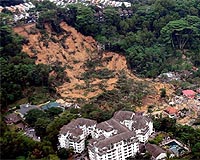| . |  |
. |
Tokyo (AFP) May 22, 2011 China and South Korea Sunday offered to help Japan recover from the March 11 quake and tsunami as Beijing lifted bans on some food imports imposed after the disasters triggered a nuclear emergency. Leaders of the three countries met in Tokyo to discuss Japan's handling of world's worst atomic crisis since Chernobyl 25 years ago. They also said they would aim this year to finish research into a wide-ranging free trade deal between the three nations. Chinese Premier Wen Jiabao announced the lifting of restrictions on some food imports from Japan a day after the three leaders dined together on cherries harvested near the stricken Fukushima nuclear plant. "These three countries are very close neighbours. We can overcome difficulties by joining hands," Wen said as the summit opened. Beijing and Seoul have been worried by radiation leaks from the crippled Fukushima Daiichi plant triggered by the March 11 earthquake and tsunami and the impact on food safety across the region. Japanese Prime Minister Naoto Kan thanked Wen and South Korean President Lee Myung-bak "for demonstrating the safety of Japan and Japanese food in the most effective manner". Wen, along with Lee, arrived in northeastern Japan Saturday in a show of support as the first foreign leaders to visit Fukushima prefecture since the monster tsunami ravaged a nuclear plant on the coast. The three Asian leaders together ate Fukushima-harvested cherries and cucumbers and visited a shelter for displaced residents 60 kilometres (37 miles) from the plant on Saturday, a day before the summit. On Sunday the nations pledged to work together to promote cooperation among nuclear safety experts and in disaster preparedness at the summit where food safety and trade issues topped the agenda. A joint summit declaration said: "We expressed our determination to bolster Japan's efforts to overcome this difficult situation through trilateral cooperation in various areas." "Japan is committed to sharing with China, the Republic of Korea and the international community at large the lessons learned from the nuclear accident and the earthquake," it also said. Japan's two Asian neighbours had voiced their displeasure to Tokyo after authorities released a massive amount of radioactive water from the crippled nuclear plant into the sea. But Wen told Kan that Beijing would lift bans on food imports from two of the 12 Japanese prefectures on which China had imposed restrictions, while not requiring radiation inspections on products other than vegetables, seafood and milk products, a Japanese official said. Wen also promised Kan that Beijing would encourage Chinese people to travel to the country. The meeting came as Japan and China looked to deepen ties damaged by a tense territorial row that broke out between the two Asian giants in September last year over a maritime collision in the East China Sea. Both countries claim the potentially resource-rich islets, known as the Diaoyus in China and Senkakus in Japan, along with the nearby seas. At a news briefing, Kan said he also expressed concerns during the summit about North Korea's uranium enrichment. The three leaders agreed on the importance for North Korea to show sincerity before six-country talks on its nuclear programme can resume and agreed to press North Korea to take appropriate action, Kan said. The three-nation meeting was first held on a regular basis in 2008.
Share This Article With Planet Earth
Related Links Bringing Order To A World Of Disasters A world of storm and tempest When the Earth Quakes
 16 dead in Malaysia orphanage landslide
16 dead in Malaysia orphanage landslideHulu Langat, Malaysia (AFP) May 22, 2011 A close-knit village on the outskirts of the Malaysian capital was grieving on Sunday for the deaths of 16 people, mostly children, after an orphanage was hit by a devastating landslide. As the search for bodies ended, a local lawmaker said the orphanage, situated at the foot of the steep hill from where the mudslip thundered down, had been built without official permission. Following he ... read more |
|
| The content herein, unless otherwise known to be public domain, are Copyright 1995-2010 - SpaceDaily. AFP and UPI Wire Stories are copyright Agence France-Presse and United Press International. ESA Portal Reports are copyright European Space Agency. All NASA sourced material is public domain. Additional copyrights may apply in whole or part to other bona fide parties. Advertising does not imply endorsement,agreement or approval of any opinions, statements or information provided by SpaceDaily on any Web page published or hosted by SpaceDaily. Privacy Statement |